What is it you want, Mary? What do you want? You want the moon? Just say the word and I’ll throw a lasso around it and pull it down. Hey. That’s a pretty good idea. I’ll give you the moon, Mary.
– George Bailey
Strange, isn’t it? Each man’s life touches so many other lives. When he isn’t around he leaves an awful hole, doesn’t he?
– Clarence
I didn’t intend to focus so much on Christmas on my blog, but no discussion of alternate universes would be complete without mentioning the film It’s a Wonderful Life—which happens to be one of my favorite movies.
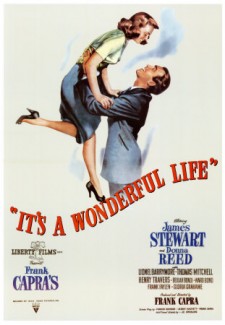 It’s a terrible cliché, but I do like to watch It’s a Wonderful Life every year, though I don’t always get to. I didn’t see it last year, and I haven’t yet this year, but with the artificial deadline of Christmas still a week away, I think I can probably fit it in. It’s a long movie, and I’ve seen it plenty of times, so it isn’t always a priority. I’m not so into Christmas that it’s about the holiday–in fact, the director, Frank Capra, didn’t really consider it a Christmas movie either, and it was originally scheduled to be released in January of 1947, but it was bumped up to December 1946 in New York for Oscar consideration.
It’s a terrible cliché, but I do like to watch It’s a Wonderful Life every year, though I don’t always get to. I didn’t see it last year, and I haven’t yet this year, but with the artificial deadline of Christmas still a week away, I think I can probably fit it in. It’s a long movie, and I’ve seen it plenty of times, so it isn’t always a priority. I’m not so into Christmas that it’s about the holiday–in fact, the director, Frank Capra, didn’t really consider it a Christmas movie either, and it was originally scheduled to be released in January of 1947, but it was bumped up to December 1946 in New York for Oscar consideration.
Though the climax of the film is set at Christmas, and traditionally it was rebroadcast at Christmas, it isn’t really a Christmas movie. I mean, not in the way that A Miracle on 34th Street and The Christmas Story are. Sometimes I get flak for liking it so much, as some people don’t really see the appeal of it or it just isn’t their thing. Admittedly, it is an overly sentimental film, but I do tend to like those when they’re done well–take Love, Actually, for instance, which is another Christmassy movie and also one of my favorites. It’s a Wonderful Life (IaWL) is also a romantic film in some ways, and I’m definitely a sap for that. And I will watch any film with Jimmy Stewart in it.
Then there’s the whole parallel universe thing.
I’m not sure when I realized that the film dealt with an alternate universe, but it may not have been until after I saw Back to the Future II, which shows a dark reality created by the absence of a different George. Some viewers may not have ever defined IaWL as such, but it’s clear that it’s built around a big “What if?” scenario: What if George Bailey had never been born?
That’s a powerful question for anyone to ask: “What would the world be like if I didn’t exist?” And in more ways than one, it’s a wish fulfillment fantasy; many of us would like to believe that we are important, if not to the world than to our families and friends. We hope that when we’re gone, we will be missed. We wonder if we had never been born, whether people’s lives might be the poorer for it.
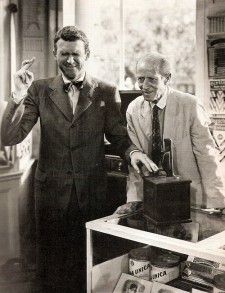 If you’ve never seen IaWL, here it is in a nutshell: George Bailey grew up in a small town, Bedford Falls, and has always dreamed of leaving it to travel the world. But for one reason after another, he’s forced to push the fulfillment of that dream farther and farther away. His father dies, forcing him to take over the family’s bank, at least until his younger brother Harry returns from college. Then his brother returns with a new wife and a better job offer. Then George gets married and gives up his honeymoon fund to keep the bank solvent during a bad recession. And you know how it goes, somehow he never does leave Bedford Falls, but he’s doing some good. The bank is performing a valuable service—it’s the only competition for the villainous Mr. Potter. And one day, George’s uncle loses the bank’s money and they’re ruined. After all George has given up already, he’s finally lost everything–or so he thinks. In a fit of rage, frustration, and despair that has been building up his whole life, he contemplates suicide and he wishes he’d never been born.
If you’ve never seen IaWL, here it is in a nutshell: George Bailey grew up in a small town, Bedford Falls, and has always dreamed of leaving it to travel the world. But for one reason after another, he’s forced to push the fulfillment of that dream farther and farther away. His father dies, forcing him to take over the family’s bank, at least until his younger brother Harry returns from college. Then his brother returns with a new wife and a better job offer. Then George gets married and gives up his honeymoon fund to keep the bank solvent during a bad recession. And you know how it goes, somehow he never does leave Bedford Falls, but he’s doing some good. The bank is performing a valuable service—it’s the only competition for the villainous Mr. Potter. And one day, George’s uncle loses the bank’s money and they’re ruined. After all George has given up already, he’s finally lost everything–or so he thinks. In a fit of rage, frustration, and despair that has been building up his whole life, he contemplates suicide and he wishes he’d never been born.
And his wish is granted.
A friendly angel decides to show George Bailey what Bedford Falls would be like without him. His brother died as a boy because George wasn’t there to save him. Ditto for another kid, who George saved in his original world by catching a prescription error in the nick of time. The town has gone to pot, or more specifically, to Potter, who has transformed it into a dystopian town called Pottersville that is the dark reflection of its original wholesome goodness. Without George Bailey, people are miserable and definitely much worse off.
 The angel’s hard lesson is learned and George returns to the world he remembers, to discover that for once in his life the town has come through for him by raising the funds to save the bank. George realizes that he’s a pretty lucky guy after all.
The angel’s hard lesson is learned and George returns to the world he remembers, to discover that for once in his life the town has come through for him by raising the funds to save the bank. George realizes that he’s a pretty lucky guy after all.
Yes, this is a very schmoopsy ending, but I actually do enjoy stories about one person making a difference and the noble, self-sacrificing protagonist as a hero—as well as the people acknowledging that gift and returning the favor, as in the subway scene in Spider-Man 2, which makes me a little teary every time I see it. (Conversely, it’s chilling to see our hero George Bailey fly off the handle, attacking the people he loves and getting drunk—as uncomfortable as watching Superman act up in Superman III or Peter Parker dance in Spider-Man 3.)
It’s also a bit much to accept that George Bailey really could have this profound an effect on all of Bedford Falls. One wonders if old Clarence has carefully constructed this alternate reality all in George’s mind, as a way of inflating his diminished sense of worth. How far does George’s influence extend? At one point they mention that his brother Harry shot down fifteen enemy planes in WWII, saving a ship full of troops; did the war go differently in a world where Harry wasn’t there, other than these lost lives? It’s both encouraging and arrogant to attribute so much to one ordinary person; but after all, the heroes we celebrate were all just ordinary people once.
One of the things I like about revisiting IaWL is that I look at it differently every few years. These days, the feel-good ending seems more bittersweet, because it suggests that it’s all right that George had to give up his dreams. I suppose this is the same message at the heart of Pixar’s Up, that as life goes on, these disappointments don’t matter because you come up with new dreams. You find unexpected happiness in the things that you do have. Family is more important than anything. But you know, I still find it kind of depressing. Is there no compromise? Can’t you help others and do the right thing without giving up your own happiness?
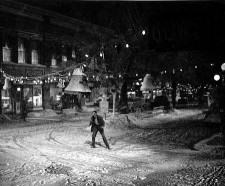
For me it’s also grating that the villain gets away with it. Mr. Potter stole that money from Uncle Billy! He’s a rich man who never has to face up to his crimes, who only gets richer at the expense of others, and meanwhile, everyone thinks that Uncle Billy is a major screw-up. (Okay, he is, but this time, it wasn’t his fault.) Potter hasn’t won the victory he wanted, but don’t you get the sense that maybe they’ve only pushed off the inevitable a little longer, that one day the Bailey Building and Loan is going to be swallowed up by Potter or his heirs, and then what will they all have? You can only depend on the goodwill of others and crowdsourcing funds to save yourself maybe once in your life.
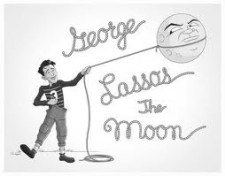 In an episode of Batman: The Animated Series, “Christmas With the Joker”, Bruce Wayne succumbs to IaWL for the first time and grudgingly admits “It has its moments.” And I think that’s the real takeaway from this film: Life isn’t wonderful all the time, but it has its moments. The happy moments shown in the movie, and particularly at the ending, are hopefully the ones that will stick with us, that balance out the hardship. To assume that everything is always going to be awesome because you have a loving family or supportive friends is perhaps naïve, but those are the things that make life worthwhile. But I don’t care what George Bailey says; keep following your dreams, dammit. Keep trying to lasso the moon.
In an episode of Batman: The Animated Series, “Christmas With the Joker”, Bruce Wayne succumbs to IaWL for the first time and grudgingly admits “It has its moments.” And I think that’s the real takeaway from this film: Life isn’t wonderful all the time, but it has its moments. The happy moments shown in the movie, and particularly at the ending, are hopefully the ones that will stick with us, that balance out the hardship. To assume that everything is always going to be awesome because you have a loving family or supportive friends is perhaps naïve, but those are the things that make life worthwhile. But I don’t care what George Bailey says; keep following your dreams, dammit. Keep trying to lasso the moon.
These days, as a writer, I also take another kind of solace in IaWL. I just learned that the film is based on a 4,100-word short story by Philip Van Doren Stern titled “The Greatest Gift”. After it was inspired by a dream, it took Stern four years to write it, and then he couldn’t find a publisher. So he self-published it in December of 1943, and one of the 200 copies he printed found its way to a producer at RKO, who bought the rights. (The story was later published as a book, again “privately,” and reprinted in magazines.) In 1945 RKO sold the rights to Frank Capra, and the rest is history—except, as it turns out, the film was generally considered unsuccessful when it was released theatrically. It only became popular in television repeats at the holidays in the 1970s and 80s. And of course today, it’s considered a classic: #11 on the American Film Institute’s 100 Years … 100 Movies List.
I think the film best succeeds at what so many parallel universe stories accomplish: It emphasizes the impact of individuals on others and the world. And it shows that we never really know what the consequences of our actions will be and how they affect others, or whether today’s failure might be tomorrow’s success.
What do you think? Do you like It’s a Wonderful Life? What do you take from it? What’s your favorite Christmas or alternate universe movie?
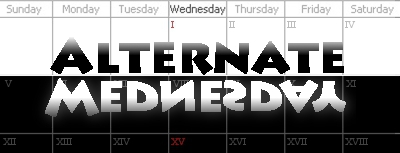
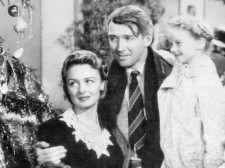
Paul Weimer (@princejvstin)
I liked the “mirror universe” aspect to IAWL more than just about anything else in the movie. I saw it after seeing that particular episode of Star Trek, so it seemed natural in my mind that the mirror universe would be dark, evil and dystopian. That’s the way mirror universes worked…
ecmyers
I think showing a world that is so upside down from the one you recognize is an easy shorthand so people understand they’re seeing a different place. Having it be so dark is more shocking and reinforces the desire to get away to the familiar. Unfortunately it doesn’t leave a lot of room for subtlety and the complexity of people.
I seem to remember thinking there was a logical flaw in there somewhere too… Was the alternate Mary (oh no! a librarian!) living in the same house they bought and fixed up together? I may be mistaken.
Oh, and some readers might realize there’s a Bert and Ernie in FAIR COIN too, just like in IaWL, but those were definitely named for the Sesame Street characters :)
Marc Vun Kannon
I see that movie and what I end up thinking about is the awful selfishness of George Bailey, that he had to be hit over the head with an angel-stick to see the effects he was having.
ecmyers
I don’t know if I would call it selfishness, so much as a lack of self-awareness, which also can be a character flaw. But this may raise the point: If he didn’t know how much good he was doing, then why did he make the choices he did? It’s also important to acknowledge that he’s responsible for his own decisions. Even if he feels trapped in his life, no one forced him to make these sacrifices.
And it might actually be more crippling than reassuring to realize that your actions have had this ripple effect on all the people around you.
I’ll think about this when I rewatch the film, maybe this weekend!
Wendy Darling
I LOVE THIS POST SO MUCH. This is one of my favorite films ever, and I really enjoyed your take on it. Both as someone who is deeply touched by the film–I can tell!–and as a fan of speculative fiction. Thanks so much for posting this.
Wendy Darling
Bleh, that last bit was unclear–I meant I could tell you were both a fan of the film and of speculative fiction, but of course, so am I. :)
ecmyers
Thank you! I’m so glad you enjoyed it. I like sharing my love for this film with others who appreciate it :)
One of my other favorite tidbits about the making of the movie: They pretty much invented a new fake (chemical) snow for it. Previously, filmmakers had used painted-white cornflakes, which required them to dub over all the actors’ lines because they made too much noise walking on set.
Liz Fichera
Christmas isn’t Christmas at my house without at least one viewing of the original IT’S A WONDERFUL LIFE.
ecmyers
I’m going to watch it tonight, or tomorrow during the day depending on family commitments :) Merry Christmas!